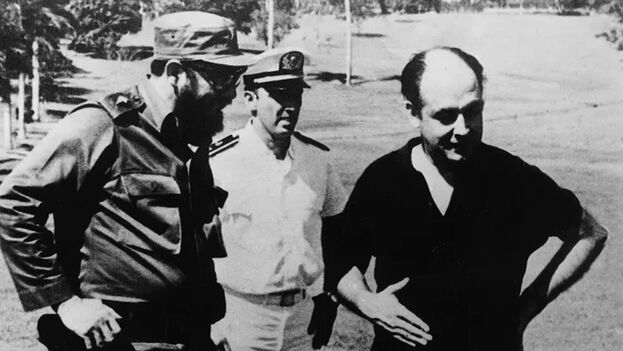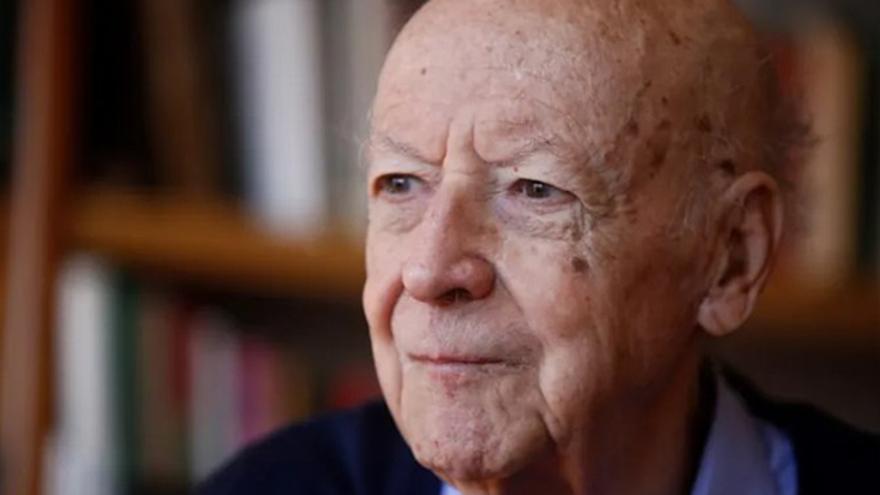
![]() 14ymedio, Carlos Franz, Madrid, March 28, 2023 — I am looking at a black and white photo. It is 1960 or 1961 and Jorge Edwards is standing in front of Chillon Castle on the shores of Lake Geneva. He is wearing a jacket and tie, and bends down slightly to hold onto the hand of a little boy who can barely walk. I am that little boy. No doubt, my father’s diplomatic colleague had asked him to hold me while he took that photo. Edwards does so with obvious reluctance. I repay his mistrust by pouting and squirming to free myself of his hand.
14ymedio, Carlos Franz, Madrid, March 28, 2023 — I am looking at a black and white photo. It is 1960 or 1961 and Jorge Edwards is standing in front of Chillon Castle on the shores of Lake Geneva. He is wearing a jacket and tie, and bends down slightly to hold onto the hand of a little boy who can barely walk. I am that little boy. No doubt, my father’s diplomatic colleague had asked him to hold me while he took that photo. Edwards does so with obvious reluctance. I repay his mistrust by pouting and squirming to free myself of his hand.
Our next encounter occurred some eighteen years later and was more auspicious. In 1978 or 1979 we met aboard an Argentine merchant ship anchored in the port of Valparaíso. A Buenos Aires playwright, who was also a sailor, was having a barbecue on the ship. Predictably, it was attended by a crowd of established and novice writers, guests and cast members.
We consumed huge chorizo steaks, good wines and a huge bottle of Chivas Regal, which the navigator-playwright had brought along from some truly free port. As evening fell on deck, I found myself comfortably talking one-on-one with Edwards. This time he welcomed me without hesitation. I discovered that it was typical of him to create sudden bonds of trust, circumventing age differences and other superficial disparities. I felt like we were becoming friends.
I, whose only desire was to leave Chile, asked him why the hell he had come out of exile in Barcelona to join the Pinochet regime. For me, that capital of the Latin American literary boom was nothing short of paradise. He answered me something like this: “Not everything is so great there either. “I would later get used to these relativizations of his, products of a natural skepticism, of a stoic equanimity. If the most perfect place is the one we see from afar, that would explain why Edwards was always leaving.

In other essays I have reflected on Edwards’ books and his political courage. Now I prefer to spin anecdotes the way Jorge often did. Remembering events is a way of keeping alive his memory, which gave us so many hours of entertaining stories, both written and oral.
A few years after that meeting on the Argentine ship, I heard him speak at a book fair that was being held under the oriental plane trees in Parque Forestal, in Santiago de Chile. A caustic writer of my generation whispered in my ear: “It’s just so smug, this pensée anecdotique.” At the time, I did not know how to refute the charge. I suffer from l’esprit de l’escalier* and only later did it occur to me that, in the case of a storyteller, anecdotal thinking may be the most appropriate and the least pretentious approach. The narrator sees individual cases. People matter more to him than groups or classes. That particularist viewpoint reflects a distrust of theories and generalizations. In the story, in the anecdote, contradiction and ambivalence coexist.
If Edwards made lavish use of anecdotes in his lectures, it was not out of smugness, as my caustic friend claimed, but rather the opposite. A good writer tells the story as he saw it or imagined it, with its disjointed details and its unresolvable ambiguities. The conclusions, the ideas, are left to the readers. The author abides by a motto attributed to Montaigne (Edwards’ patron saint): “What do I know?”
Several decades of friendship passed. In 2018 Edwards and I were both invited to participate in a series of summer courses held at the Escorial. He was 87 years old and mentally he was not the same. He was easily sidetracked. I gave my talk and then went to hear his. He began improvising as usual, without notes. I feared the worst. But it turned out that, once on the podium, he found his bearings.
He spoke for an hour and half. About Stendhal, about the pianist Claudio Arrau, about quirky people in his family. He spoke about a Santiago de Chile where the streetcars were once so piercingly loud they screeched. It was an implausible hodgepodge. But he made it sound convincing. He wandered without getting lost. His memory went back and forth like someone at a loom weaving a tapestry of free associations. Despite its apparent disorder, that class at the Escorial gave us privileged access to the ways in which a storyteller’s imagination works. From the fortuitous contact with incoherent data, the spark that illuminates an original idea can sprout.
Jorge Edwards was not an easy person. No true artist is. He knew how to be sociable and welcoming. Yet he could also be cold. He would open his house and his bar and his rich memory to almost anyone. He was even generous in what he forgot, easily burying recent insults he had received. But it was difficult for him to express affection. In 2001 he stayed for a few days at my house in Berlin. We strolled around and enjoyed ourselves. As he was leaving, I went with him to hail a taxi. At the corner I leaned in to hug him but his reaction was too quick. He turned his back to me and walked away, waving a hand over his shoulder. A hand that said, “No emotional goodbyes!” That was Jorge.
He had to die for me to have my revenge. Two hours after his death, I arrived at his house with a group of friends. His body lay on the bed, still warm, waxy, as thin as a figure in an El Greco painting. Taking advantage of a minute we had alone, I put my hand on his forehead and caressed his skull, that “noble skull.” He couldn’t refuse, nor could he make impatient gestures that meant “no emotional goodbyes.”
Later my friends and I shared a toast. If not for the slight inconvenience of being dead, I am sure Jorge would risen up from his bed to join in. And he would have begged us not to get sentimental. But he couldn’t do this. So now I am taking advantage of his silence to be unabashedly sad. And I will refute that line by the Spanish poet Gustavo Bécquer: “How alone the dead are left.” Not true. We are left even more alone.
*Translator’s note: a French expression that describes the act of thinking of a witty response only when it is too late. It was coined by Denis Diderot (1713-1784) in Paradoxe sur le comédien.
____________
COLLABORATE WITH OUR WORK: The 14ymedio team is committed to practicing serious journalism that reflects Cuba’s reality in all its depth. Thank you for joining us on this long journey. We invite you to continue supporting us by becoming a member of 14ymedio now. Together we can continue transforming journalism in Cuba.
